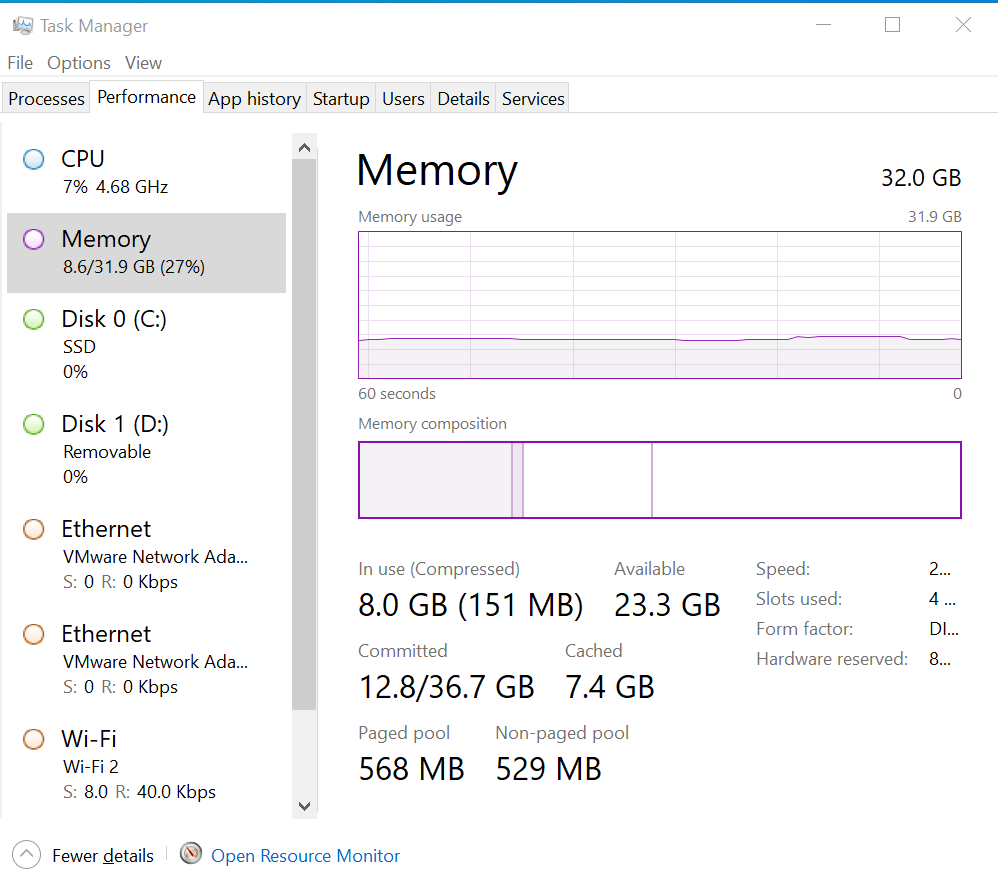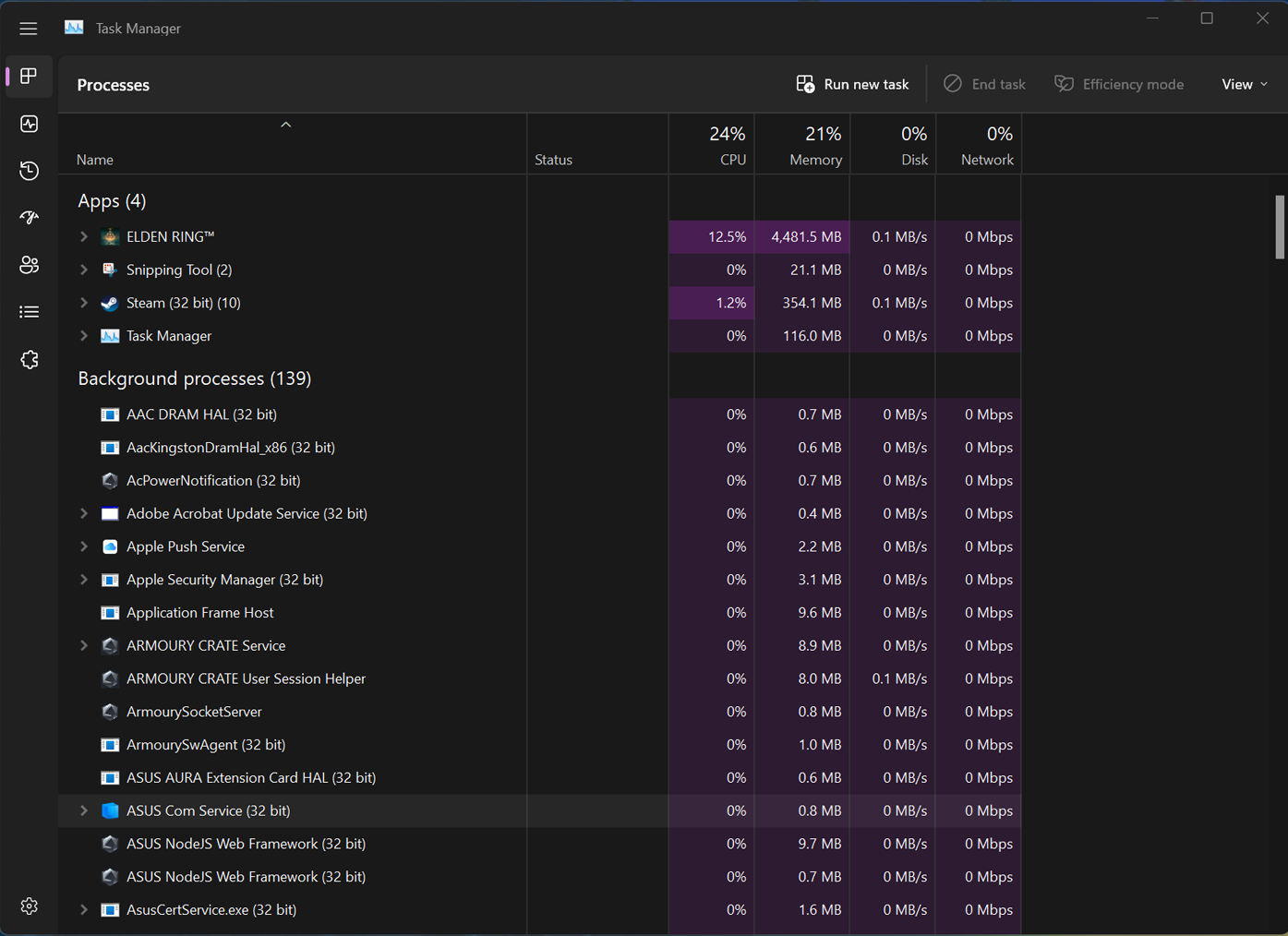Don’t Buy a PC With 8GB of RAM (Unless You Plan to Upgrade It)
Some expensive ultrabooks and gaming laptops come with just 8GB on board.
We're two decades into the 21st century, a time where many of us were expecting to have flying cars or apartments on the moon. Instead, tech companies are still selling floppy disks and brand new PCs with an untenable 8GB of RAM. By all means, grab a 3.5-inch, 1.44 MB floppy disk if you still need one. But, for Woz’s sake, don’t get a PC with less than 16GB of memory, unless you plan to buy more RAM and install it yourself.
We’ve reached the point in computing history where you can’t competently run Windows and browse the Internet with less than 16GB on board. On my desktop PC running Windows 10, it takes just 8 Chrome tabs, Slack and Spotify running to cross the 8GB threshold. My regular use case of four dozen tabs takes me up to around 15GB, without running any games or productivity apps. Even with nothing but background services running, I’m using 5.5GB.
Even playing one game will take you past the 8GB limit many $1,000 gaming PCs have. Senior Editor Sarah Jacobsson Purewal shared a screenshot (see how to take screenshots in Windows) of her task manager where Elden Ring is eating 4.4GB of RAM and Steam is gobbling another 354MB. Once you exceed your computer’s physical RAM, the OS will compensate by swapping data in and out of your paging file, significantly harming performance.
Despite the fact that modern Windows PCs really need 16GB of RAM and the cost of adding more RAM is minimal, major PC vendors continue offering systems with a mere 8GB. And we’re not talking about kids’ Chromebooks or $199 cheapo laptops with Pentium CPUs! High-powered $900 gaming laptops and $1,300 ultrabooks also come with just 8GB. By the way, another 8GB of laptop RAM would cost you $25 on Amazon, so it must cost OEMs, who get to pay wholesale, a fraction of that to get this right.
Imagine that your mouth is watering and you’re dying for a Big Mac dinner. You pull up to the McDonald’s Drive-through and see a sign that says “Big Mac, starting at $5.99.” So you order the burger, but, when you pull it out of the bag, you’re surprised to see that it only has one beef patty, one slice of pickle, no cheese, no Big Mac Sauce and no sesame seeds on the bun. You then find out that a “real” Big Mac with the taste you’d expect costs $9.99. McDonald’s wouldn’t sully its name by offering a sub-par experience that would make Grimace blush. Only PC OEMs would do such a thing.
Dell currently sells a config of its flagship XPS 13 laptop with 8GB for a whopping $1,249, while Lenovo’s entry-level ThinkPad X1 Carbon (Gen 10) is $1,319 with 8GB. These two laptops are meant to compete with the best Ultrabooks on the market, and they do when you buy configurations that come with a decent amount of memory. What’s worse in the case of Ultrabooks like these is that the RAM is soldered to the motherboard so there’s no way to upgrade.
Many gaming laptops (including some of the best gaming laptops under $1,500) and desktops also come with just 8GB of RAM, but the good news there is that you can almost always upgrade the memory on your own, a cost you should build into your budget and plan to do right away. For example, Walmart has an MSI GF63 gaming laptop for $599. For that price, you have to settle for lesser specs like a GTX 1650, 256GB SSD and, yes, 8GB of RAM. But you can open it up and swap the RAM for 2 x 8GB DIMMs, which will make your wallet about $50 lighter, but consider that part of the price. (While you’re in there you should also install a roomier SSD, but that’s the subject of another story.)
Get Tom's Hardware's best news and in-depth reviews, straight to your inbox.
We’d rather that companies like MSI just make 16GB the minimum standard and raise price as necessary, but as a consumer, you can make 16GB your minimum. Don’t even consider buying a computer with 8GB of RAM that can’t be upgraded. And, if you do see a great deal on an 8GB system, make sure you can also get the RAM and bring it up to 16GB.
If you already have a PC with 4, 8 or even 16GB of memory, adding more RAM is one of the best sub-$100 upgrades you can make. Just check the service manual for your PC or motherboard or visit Crucial’s Advisor to find out the exact type of RAM you need.
Avram Piltch is Managing Editor: Special Projects. When he's not playing with the latest gadgets at work or putting on VR helmets at trade shows, you'll find him rooting his phone, taking apart his PC, or coding plugins. With his technical knowledge and passion for testing, Avram developed many real-world benchmarks, including our laptop battery test.
-
kyzarvs On my 32GB machines, I typically run 7.7GB idle with a browser open.Reply
On a 4GB customer laptop, I have chrome open and run 2.7GB with no appreciable performance difference for basic browsing. SSD vs spinner is by far the biggest differentiator on low-spec machines.
Doesn't windows adapt to the RAM it has avialable? I freely admit that 8GB is preferred for browsing + MS Office generic use (our company has two very different spec levels for pupils & staff in schools for example), but the apocolyptic tone of the article is a little... much? -
closs.sebastien a lot of people are just using internal website as professional tool..Reply
or just some sharepoint/ms-office things...
16 gb would be a lot of overkill. like if you recommend a core i9 for them.
Windows will eat 8 gb if it has it (and make pre-cache). That doesn't mean it really need those 8 gb.
and, by the way, why the hell people are using/opening 40 tabs in browser, they can't read them at the same time...
I have 32 go, and in 3 years, I went over 16 gb a very few times, even with FlightSimulator or big loads. most of the time my computer is at 4-5 gb. -
magbarn I'm surprised he didn't mention Apple who continues to solder in 8gb ram and 256gb SSDs in >$1000 machines. At least the majority of Windows PC still have socketed RAM.Reply -
closs.sebastien you article should differenciate: yes, don't buy a new computer with 8 gb... IF YOU ARE A POWER-USER.Reply -
BX4096 Reply
No self-respecting power user would have less than 32gb on their new machine in 2022. Personally, I've been sitting on 64gb for almost a decade and you'd be surprised how often I needed every single bit of it.closs.sebastien said:you article should differenciate: yes, don't buy a new computer with 8 gb... IF YOU ARE A POWER-USER. -
mitch074 I find it disgusting that current Windows builds use up so much RAM - 2.4 Gb allocated after a format and reinstall after upgrade and reboot ? What for ? What requires so much RAM that it needs more than double what Windows 7 allocated in the same situation ? Adverts ? Microsoft-sanctioned spyware?Reply
So, OK, operating systems get more and more bloated, I know.
I also know that I fail to understand why Skype allocates 500 to 1000 Mo of RAM, Teams takes up the same thing and Edge gobbles down RAM - eventhough all three software run the very same thing : Chromium ! And don't try to talk to be about RAM isolation, using NX would be far enough to prevent it.
Come on, what does Skype currently do that Skype for Windows did a couple years ago while using only 140 Mb of RAM? Apart from crashing, that is... -
InvalidError With memory near all-time low cost per GB, I wouldn't recommend buying anything with less than 16GB either. Running out of RAM is the easiest way to nuke performance and responsiveness. While having an SSD may help, it is so easy to blow through 8GB that the SSD is likely to see accelerated wear from swapping. Just opening my minimum complement of always opened stuff puts me at 10-11GB shortly after booting. My mother doesn't use her laptop for much besides Facebook and even her pretty much bloat-free setup typically sits at 6GB out of 8GB in use.Reply
The cost to you of upgrading from 8GB to 16GB if you ever need to do something more intensive than basic web browsing is ~$50 + the time and other possible costs it takes to do the DIMM swap assuming the laptop has reasonably accessible socketed memory. As pointed out in the article, some PC/laptop manufacturers are pitching 8GB computers at gamers. That will blow straight through 8GB.closs.sebastien said:a lot of people are just using internal website as professional tool..
or just some sharepoint/ms-office things...
16 gb would be a lot of overkill. like if you recommend a core i9 for them.
The incremental cost to the manufacturer putting in 16GB instead of 8GB is only $20-25 extra.
If you have ever experienced the severe performance degradation that comes from running out of real memory, ~$20 is very cheap insurance against your SSD and performance getting stomped by swapfile traffic if you plan to keep the computer for any decent amount of time.
8GB is barely enough for my mother visiting Facebook. Anyone doing more than that and especially any sort of gaming should aim for 16GB at a minimum. I'm with BX there, power user territory starts at 32GB.closs.sebastien said:you article should differenciate: yes, don't buy a new computer with 8 gb... IF YOU ARE A POWER-USER. -
closs.sebastien Reply
I have 32.. I went over 16 a very few times in 3 years... 32 never used.BX4096 said:No self-respecting power user would have less than 32gb on their new machine in 2022. Personally, I've been sitting on 64gb for almost a decade and you'd be surprised how often I needed every single bit of it. -
closs.sebastien Reply
skype.. does it still exist?mitch074 said:I find it disgusting that current Windows builds use up so much RAM - 2.4 Gb allocated after a format and reinstall after upgrade and reboot ? What for ? What requires so much RAM that it needs more than double what Windows 7 allocated in the same situation ? Adverts ? Microsoft-sanctioned spyware?
So, OK, operating systems get more and more bloated, I know.
I also know that I fail to understand why Skype allocates 500 to 1000 Mo of RAM, Teams takes up the same thing and Edge gobbles down RAM - eventhough all three software run the very same thing : Chromium ! And don't try to talk to be about RAM isolation, using NX would be far enough to prevent it.
Come on, what does Skype currently do that Skype for Windows did a couple years ago while using only 140 Mb of RAM? Apart from crashing, that is... -
closs.sebastien ReplyInvalidError said:With memory near all-time low cost per GB, I wouldn't recommend buying anything with less than 16GB either. Running out of RAM is the easiest way to nuke performance and responsiveness. While having an SSD may help, it is so easy to blow through 8GB that the SSD is likely to see accelerated wear from swapping. Just opening my minimum complement of always opened stuff puts me at 10-11GB shortly after booting. My mother doesn't use her laptop for much besides Facebook and even her pretty much bloat-free setup typically sits at 6GB out of 8GB in use.
The cost to you of upgrading from 8GB to 16GB if you ever need to do something more intensive than basic web browsing is ~$50 + the time and other possible costs it takes to do the DIMM swap assuming the laptop has reasonably accessible socketed memory. As pointed out in the article, some PC/laptop manufacturers are pitching 8GB computers at gamers. That will blow straight through 8GB.
The incremental cost to the manufacturer putting in 16GB instead of 8GB is only $20-25 extra.
If you have ever experienced the severe performance degradation that comes from running out of real memory, ~$20 is very cheap insurance against your SSD and performance getting stomped by swapfile traffic if you plan to keep the computer for any decent amount of time.
8GB is barely enough for my mother visiting Facebook. Anyone doing more than that and especially any sort of gaming should aim for 16GB at a minimum. I'm with BX there, power user territory starts at 32GB.
yes, we all agree.
If you "use" your computer seriously, you should have 16 or 32. but no need for bothering the grandma because she has only 8.


